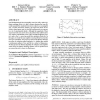Free Online Productivity Tools
i2Speak
i2Symbol
i2OCR
iTex2Img
iWeb2Print
iWeb2Shot
i2Type
iPdf2Split
iPdf2Merge
i2Bopomofo
i2Arabic
i2Style
i2Image
i2PDF
iLatex2Rtf
Sci2ools
116
click to vote
KDD
2005
ACM
2005
ACM
Pattern-based similarity search for microarray data
One fundamental task in near-neighbor search as well as other similarity matching efforts is to find a distance function that can efficiently quantify the similarity between two objects in a meaningful way. In DNA microarray analysis, the expression levels of two closely related genes may rise and fall synchronously in response to a set of experimental stimuli. Although the magnitude of their expression levels may not be close, the patterns they exhibit can be very similar. Unfortunately, none of the conventional distance metrics such as the Lp norm can model this similarity effectively. In this paper, we study the near-neighbor search problem based on this new type of similarity. We propose to measure the distance between two genes by subspace pattern similarity, i.e., whether they exhibit a synchronous pattern of rise and fall on a subset of dimensions. We then present an efficient algorithm for subspace near-neighbor search based on pattern similarity distance, and we perform tests...
Data Mining | KDD 2005 | Pattern Similarity Distance | Similarity Matching Efforts | Subspace Pattern Similarity |
Related Content
| Added | 30 Nov 2009 |
| Updated | 30 Nov 2009 |
| Type | Conference |
| Year | 2005 |
| Where | KDD |
| Authors | Haixun Wang, Jian Pei, Philip S. Yu |
Comments (0)

